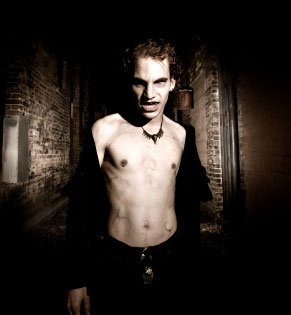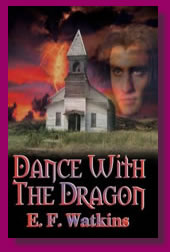By E. F Watkins
Why does the image of the vampire have such undying appeal? I think because, as developed over the ages by various authors and filmmakers, he has come to embody a range of qualities that both frighten and fascinate us.
 1. Eternal life: We all think we’d like to live forever, even though it could have its drawbacks. Since the vampire usually keeps the appearance he had when he died, many remain forever young or at least in the prime of life. In terms of story lines, this trait also links him with the past–he can re-encounter his lost loves or old enemies in reincarnated form. But on the dark side, he’s a walking dead man who seems to know the secrets of the grave, and beyond. And of course, he must drink blood to survive.
1. Eternal life: We all think we’d like to live forever, even though it could have its drawbacks. Since the vampire usually keeps the appearance he had when he died, many remain forever young or at least in the prime of life. In terms of story lines, this trait also links him with the past–he can re-encounter his lost loves or old enemies in reincarnated form. But on the dark side, he’s a walking dead man who seems to know the secrets of the grave, and beyond. And of course, he must drink blood to survive.
2. Drinking blood: A great metaphor for thriving at the expense of others–and don’t we all know someone like that! Depending on the approach of the author, a vampire can attack violently like a werewolf, and kill each time he bites. Or, like Stoker’s original Dracula, he can drain a victim slowly over time, which is much creepier. The lust for blood has been used to parallel an addiction to sex, alcohol or drugs. It also symbolizes absorbing the victim’s soul or spirit. In some fiction, a vampire can survive on animal, artificial or stored blood; in others, only human blood from a live victim will do.
3. Power over others: The vampire controls his victims mentally. He may use hypnosis or simply gain telepathic control from taking their blood. He can compel these slaves to do his will, even at the risk of their own lives. In Stoker and other traditions, if the vampire master is destroyed, any of his victims who are not yet dead recover completely.
4. Creating other vampires: Sometimes this happens with just one bite; sometimes the victim must be drained to death; sometimes only a “baptism”–drinking the master’s blood, too–causes the change. Even though leaving other vamps in his wake tends to draw suspicion, a fictional bloodsucker may feel compelled to create a mate of his own kind, or a whole kindred community, to relieve his…
5. Loneliness: Whether isolated or part of a vampire clan, he lives as a social outcast. In modern books and movies, vampires sometimes parallel gang-bangers, street people, gays and minorities–anyone seen as out of the mainstream. The vampire can never fully relate to humans because at worst he feeds off them and at best he outlives them.
6. Special powers & weaknesses: He’s invulnerable to the usual weapons such as guns and knives, and has superhuman strength, speed and agility. However, in many plots he is vulnerable to certain religious and folk symbols and to sunlight. In Stoker’s novel, Dracula could go out in the daytime but could not use his special powers then. Whether or not a vampire needs to lie in a coffin, he usual rests in darkness to recharge. And of course he has paranormal skills–he reads minds, moves things with his mind, may disappear and reappear, and may change into a mist or an animal.
7. Sensuality: Most vampires have heightened, animalistic senses and superhuman stamina. The more subtle ones seduce, rather than overpower, their victims. And whether or not they can have “normal” sex with humans or other vampires, the bite symbolizes a sexual union.
Every author emphasizes certain traits over others and creates a slightly different set of guidelines. Stoker’s vamps were bound by different rules than those of Stephen King, Anne Rice or Charlaine Harris. But that is why, as a character, the vampire lives on–because he can represent so many things to different people!
 In my own vampire novel, DANCE WITH THE DRAGON, I played up the less-often-exploited talents of remote viewing and mind control, and I pit one vampire who was trying to create his own cult/community against another who was passing for human and living with a human lover. DD, published through Amber Quill Press, won an EPPIE Award in 2004 as Best Horror Novel. Because many people, including one reviewer, said they wanted to know more about how the hero and heroine first forged their unusual relationship, I’m now working on a prequel, BLOOD WILL TELL.
In my own vampire novel, DANCE WITH THE DRAGON, I played up the less-often-exploited talents of remote viewing and mind control, and I pit one vampire who was trying to create his own cult/community against another who was passing for human and living with a human lover. DD, published through Amber Quill Press, won an EPPIE Award in 2004 as Best Horror Novel. Because many people, including one reviewer, said they wanted to know more about how the hero and heroine first forged their unusual relationship, I’m now working on a prequel, BLOOD WILL TELL.
Happy writing to all!
–E. F Watkins
www.efwatkins.com

I have to agree with the following sentence:
Stoker’s vamps were bound by different rules than those of Stephen King, Anne Rice or Charlaine Harris.
But at the same time, and I’ll discuss this in my own blog I’m going to send to Lori, there are certain myths that have their own rules as well.
This was an excellent list though!
It really is interesting why we like vampires. We love these dead guys.
I have never been able to break it down and figure out what is so appealing to me about vampires. They just are and I guess that’s all that really matter in the end lol
What about this picture? Does that kind of vampire appeal to you? Honestly, I picked it out the other night and then I think I had a nightmare about it. :D
Lori
What a well thought out breakdown on vampires in lit.
I personally love seeing how each author twists and changes what is basically a very olf folk monster to thier own style.
That was a great list of the general characteristics of various vampires. I enjoyed that you put variations in each of the characteristics to encompass the most generic ones used.
When you list it like that, really, what’s not to like and love about vampires. Cuddly, they may not be, in general, but hott, they always are.
Deidre
Great list of vampire characteristics!
I totally agree with “the vampire lives on–because he can represent so many things to different people!” Also, your list of vampire characteristics was very interesting.
And that picture is creepy, Lori! I like my vamps a little less scary looking! LOL! :D
Interesting post. Those various powers and seductive sensuality is what draws me to their stories.
i have always been facinated by vampires… there is just so much about them that i find interesting…
great post by the way…
Great list. I really agree with it. And I also like the synopsis for your book. I’ll have to keep an eye out for it here.
I like the sound of DANCE WITH THE DRAGON… great post… :D
Great post! I enjoyed reading the general characteristics of vampires.
Dance With The Dragon sounds really interesting. Fascinating post!
I think vampires are the ultimate bad boy adn we all love bad boys
Living forever might not be so bad, unless you get changed at a time in your life where you are old, and not as attractive as you once were. Like in True Blood, some of the vampires weren’t changed in their prime, and they are unhappy that they have to live forever in that form. :)
When I was first introduced to read a vampire romance book, all that came through my head was the ‘scary’ thoughts that I always connected with vamps from the late night movies on the weekend when I was a teen. I eve brought back the book to the store but ended going back because readers convinced me it wasn’t that way with vampire romance books. I love now how it comes together with the sensuality, as you explain, “the bite symbolizes a sexual union” and found it to be beautifully written and sensual! There’s been others with the ‘bad’ vamps as well and the killings, etc, but I’m no longer afraid to read them, I now crave reading them. I had alot of misunderstanding that its different with the vampire romance books than the horror. This is great post. Another I want to keep!
Fascinating post! I have always been particularly intrigued by the longevity of vampires—-partly because I love history, and would love to meet someone who had lived through what I can only read about. But this very longevity also has a bittersweet component, since it means watching those you love age and die before you do. So there’s that nice bit of romantic angst as well.
For me the first real draw to the vampire was not aging….Remaining young and beautiful for all time it’s quite seductive.